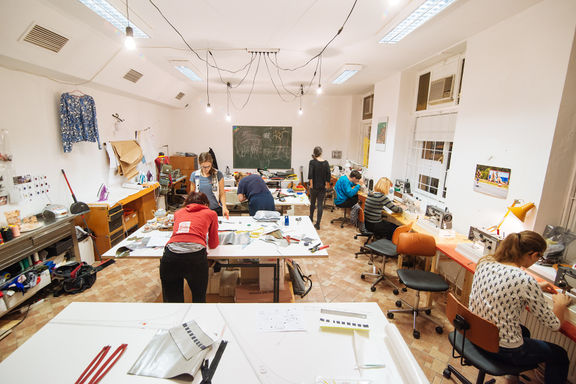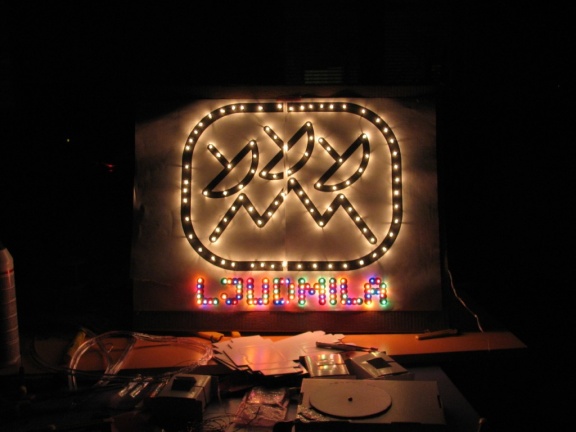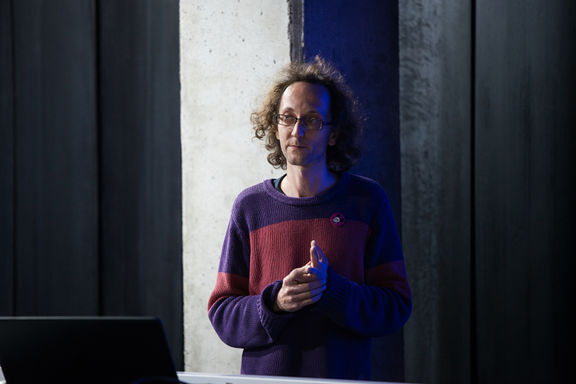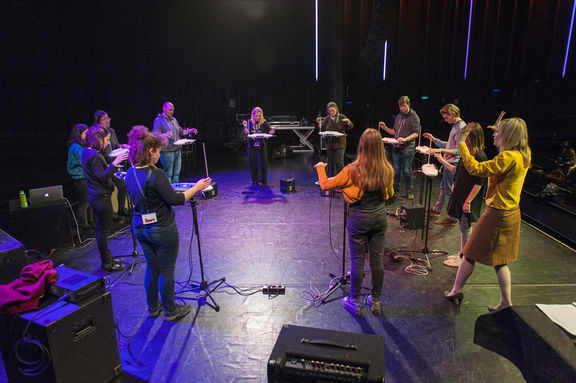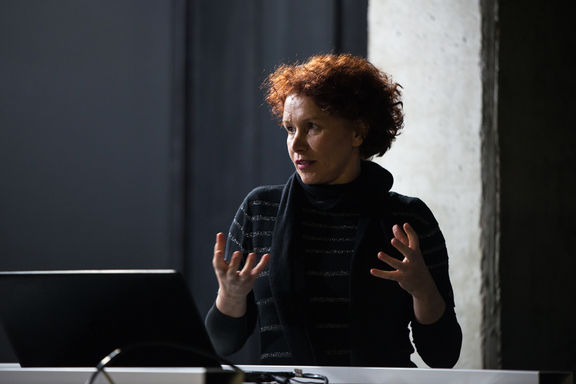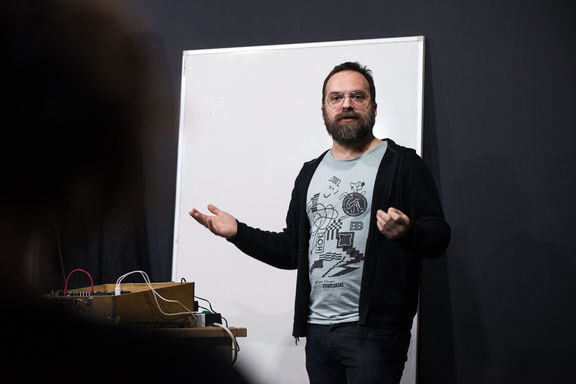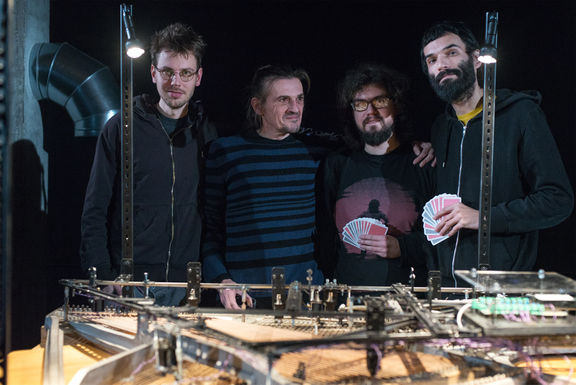Difference between revisions of "Ljudmila Art and Science Laboratory"
Anže Zorman (talk | contribs) (Updated 2017: almost finished) |
|||
| Line 1: | Line 1: | ||
{{Article | {{Article | ||
| − | | status = | + | | status = TOPROOFREAD NIFERTIK! |
| maintainer = Anže Zorman | | maintainer = Anže Zorman | ||
}} | }} | ||
| Line 17: | Line 17: | ||
| founded by = | | founded by = | ||
| founded by 2 = | | founded by 2 = | ||
| − | |||
| − | |||
| organised by = | | organised by = | ||
| − | |||
| − | |||
| managed by = | | managed by = | ||
| − | |||
| − | |||
| − | |||
| − | |||
| − | |||
| opening hours = | | opening hours = | ||
| frequency = | | frequency = | ||
| Line 69: | Line 60: | ||
{{Teaser| | {{Teaser| | ||
| − | {{Image|Ljudmila in lights.jpg}} | + | {{Wide Image|Ljudmila in lights.jpg}} |
| − | [[Ljudmila Art and Science Laboratory]] | + | Set up in the middle of the 1990s, [[Ljudmila Art and Science Laboratory]] has ever since been bent on various way through which to weave together technology, art, science, and civil society. As such it is a place where hackers and artists meet, yet also a place where culture is reflected and modified through the lens of politics, as generated by the developments of communications technologies. |
| − | Ljudmila runs [[Strictly Analog Festival]] and the [[PIFcamp]]. | + | Its programmes are wide-ranging. Ljudmila runs the [[Strictly Analog Festival]] and the art&hacking meeting [[PIFcamp]]. Since 2010 it operates the [[Culture.si]] portal and database, and as of 2013 also the metasearch engine and cultural news and events aggregator [[Kulturnik.si]]. From 2011 it acts as a public lead of [[Creative Commons Slovenia]]. It organises regular workshops in use of open source software and DIY technological practices; supports the production of new media artworks; has an orchestra; and more. |
| + | }} | ||
| + | |||
| + | ==Mission== | ||
| + | |||
| + | Ljudmila engages in the development and popularisation of open culture, free licences and software, and in new ways of data distribution. It detects the ways through which the transformations in the field of information and communications technologies affect the society and encourages the corresponding cultural and artistic practices. | ||
| + | |||
| + | ==Venue== | ||
| − | + | As of 2017 Ljudmila is stationed in a skyscraper in the centre of Ljubljana, sharing the 8th floor with the [[Delak Institute]] (exploring performance arts and space 'culturalisation') and [[Projekt Atol Institute]]. Together they work on establishing the floor as a new venue for new media art and contemporary theatre. | |
| − | |||
==Background== | ==Background== | ||
| − | Self-proclaimed as 'the latest spin-off' from the Open Society Institute - Slovenia (1992–2000), the Ljudmila Art and Science Laboratory was established by 10 new & all media artists, developers, hackers | + | The laboratory is a successor to the [[Ljudmila - Ljubljana Digital Media Lab]], as of 1994 a programme of the Open Society Institute Slovenia and later also of the [[KUD France Prešeren Arts and Culture Association]]. Self-proclaimed as 'the latest spin-off' from the Open Society Institute - Slovenia (1992–2000), the Ljudmila Art and Science Laboratory was established by 10 new & all media artists, software developers, hackers, and computer engineers in [[established::2010]]. |
The founding members of the Ljudmila Art and Science Laboratory are [[Urban Belina]], [[Mitja Doma]], [[Luka Frelih]], [[Tomaž Ižanc]], [[Žiga Kranjec]], [[Igor Križanovskij]], [[Zoran Obradović]], [[Alenka Pirman]], [[Robertina Šebjanič]], and [[Živa Zupan]]. | The founding members of the Ljudmila Art and Science Laboratory are [[Urban Belina]], [[Mitja Doma]], [[Luka Frelih]], [[Tomaž Ižanc]], [[Žiga Kranjec]], [[Igor Križanovskij]], [[Zoran Obradović]], [[Alenka Pirman]], [[Robertina Šebjanič]], and [[Živa Zupan]]. | ||
{{YouTube|dXQdhT-f3YE}} | {{YouTube|dXQdhT-f3YE}} | ||
| + | |||
| + | ==Education== | ||
| + | |||
| + | Ljudmila organises regular workshops in basic and advanced use of open source software (Blender, Pure Data, MediaWiki), as well as the ''Free Circuit'' [Prosto-vezje] workshops and ''Digital Dish'' public lectures and artist talks by international new media artists. | ||
| + | |||
| + | The activities usually feature various modes of "tinkering" with electronic circuits and technology in general, hacking and re-imagining it with the help of free software ('home-made synths' and 'wearable electronics' can serve as an example). The participants are encouraged to search for further uses and include the findings in their artistic work. Since 2013 Ljudmila is developing the education programme in collaboration with the [[Projekt Atol Institute]]. | ||
| + | |||
| + | ==Art projects and residencies== | ||
| + | |||
| + | Ljudmila's artistic endeavours, sometimes done together with [[Projekt Atol Institute|Projekt Atol]], are rather diverse. However, the most obvious is its support for young artist and their new media productions. It also organises artists residencies, inviting and hosting one artist from abroad per year. | ||
| + | |||
| + | == Portals and digital agenda == | ||
| + | |||
| + | On the behalf of the [[Ministry of Culture]] Ljudmila runs two web portals – [[Culture.si]], which offers information on Slovene cultural producers, venues, festivals and support services, all in one place; and [[Kulturnik]], a digital aggregator and search engine for all things (Slovene) culture. | ||
| + | |||
| + | In 2013 Ljudmila Art and Science Laboratory was invited by the [[Ministry of Culture]] to collaborate with the [[National and University Library]] and [[Archives of the Republic of Slovenia]] and organise a line of discussions related to ''Digital Agenda in the Field of Culture'' in order to identify the issues and outline basic standards and recommendations for a common strategy. The working group led by Ljudmila focused on data acessibility, while the other two groups discussed the processes of digitisation and permanent data preservation. | ||
==Strictly Analog Festival and PIFcamp== | ==Strictly Analog Festival and PIFcamp== | ||
| − | In 2013 Ljudmila launched the [[Strictly Analog Festival]], an international joint project with partner institutions | + | In 2013 Ljudmila launched the [[Strictly Analog Festival]], an international joint project with partner institutions from Graz, Trieste, and Tokyo as well as with the locally based [[Lighting Guerrilla Festival]], [[MoTA Museum of Transitory Art]], and [[Projekt Atol Institute]]. |
| − | + | The year 2015 saw the birth of [[PIFcamp]], a temporary nomad hacker-base, taking place in the idyllic valley in Trenta. Several hands-on workshops, presentations, field trips and laboratory research are assisted by experienced local and international guests from different fields. It is organised by Ljudmila Art and Science Laboratoy and [[Projekt Atol Institute]]. | |
{{Vimeo|157121775}} | {{Vimeo|157121775}} | ||
| − | |||
| − | |||
| − | |||
| − | |||
==Theremidi Orchestra== | ==Theremidi Orchestra== | ||
| − | As a result of a theremin and theremidi physical interface workshop at Ljudmila in 2011 the electronic noise ensemble [[Theremidi Orchestra]] was founded in 2011, in collaboration with Borut Savski | + | As a result of a theremin and theremidi physical interface workshop at Ljudmila in 2011, the electronic noise ensemble [[Theremidi Orchestra]] was founded in 2011, in collaboration with Borut Savski from [[Cirkulacija 2]]. The Theremidi audiovisual public presentations at festivals are usually combined with open workshops for making DIY instruments and gadgets. |
{{wide image|Ljudmila Art and Science Laboratory 2013 Theremidi Orchestra.jpg}} | {{wide image|Ljudmila Art and Science Laboratory 2013 Theremidi Orchestra.jpg}} | ||
| − | |||
| − | |||
| − | |||
| − | |||
==See also== | ==See also== | ||
| + | * [[PIFcamp]] | ||
* [[Culture.si]] | * [[Culture.si]] | ||
* [[Kulturnik.si]] | * [[Kulturnik.si]] | ||
| − | * [[ | + | * [[Strictly Analog Festival]] |
| − | |||
* [[Theremidi Orchestra]] | * [[Theremidi Orchestra]] | ||
| − | |||
| − | |||
* [[Projekt Atol Institute]] | * [[Projekt Atol Institute]] | ||
| + | * [[Creative Commons Slovenia]] | ||
| + | * [[Ljudmila - Ljubljana Digital Media Lab]] (further history of the laboratory) | ||
== External links == | == External links == | ||
Revision as of 22:01, 14 June 2017
-
23 Apr 2023
Hybrid Acoustics concert including patterns in modulation by Blaž Pavlica produced by Ljudmila Art and Science Laboratory at the International Conference on Live Coding (ICLC).
-
to
19 Apr 2023
23 Apr 2023
-
14 Dec 2019
»On the Internet, no one can hear you're a dog, a lecture by Luka Frelih (Ljudmila Art and Science Laboratory) and a live performance by Container Doxa
at the Sonic Experiments
-
to
9 Nov 2019
10 Nov 2019
Tadej Droljc's presentation Composing with isomorphic audiovisual gestalts and a performance of his work Capillaries Capillaries, organised by Ljudmila Art and Science Laboratory in the framework of the EASTN-DC project.
at the Festival for Art, Science & Technology
-
to
16 Oct 2019
19 Oct 2019
An installation Loops in transmission and SODA, A semi-modular instrument building DIY workshop by Staš Vrenko, produced by Ljudmila Art and Science Laboratory
at the Agora Creative
-
to
13 May 2019
16 May 2019
Liminoid installation by Saša Spačal and Matic Potočnik produced by Ljudmila Art and Science Laboratory, a member of the European Art - Science - Technology Network (EASTN) for Digital Creativity,
at the Queens Festival
-
to
23 Mar 2019
5 May 2019
The interactive sound installation Time Displacement: Chemobrionic Garden by Robertina Šebjanič, Aleš Hieng – Zeron and Ida Hiršenfelder (Projekt Atol Institute, Ljudmila Art and Science Laboratory)
-
30 Jun 2018
A semi-modular instrument building workshop Soda by Staš Vrenko and a lecture by Luka Frelih (Ljudmila Art and Science Laboratory, Creative Commons Slovenia) in the frame of the European Art-Science-Technology Network Week
-
to
5 May 2018
29 Jun 2018
Dark Drops by Robertina Šebjanič and Time Displacement / Chemobrionic Garden by Robertina Šebjanič, Aleš Hieng - Zergon, and Ida Hiršenfelder (Projekt Atol Institute, Ljudmila Art and Science Laboratory),
-
to
28 Apr 2017
30 Apr 2017
Luka Frelih (Ljudmila Art and Science Laboratory, Creative Commons Slovenia) and Dare Pejič (Creative Commons Slovenia) at the Creative Commons Global Summit
-
to
20 Mar 2017
22 Mar 2017
The interactive sound installation Time Displacement: Chemobrionic Garden and artist talk by Robertina Šebjanič, Aleš Hieng – Zeron and Ida Hiršenfelder (Ljudmila Art and Science Laboratory)
-
to
1 Feb 2017
5 Feb 2017
An audio-video performance and workshops by the Theremidi Orchestra, produced by Ljudmila Art and Science Laboratory and Projekt Atol Institute in cooperation with Werkstatt ThoughtWorks Berlin and SPEKTRUM and organised in cooperation with the Slovenian Cultural Centre in Berlin and the Embassy of the Republic of Slovenia Berlin,
-
to
30 Sep 2016
2 Oct 2016
Luka Frelih (Ljudmila Art and Science Laboratory, Creative Commons Slovenia), Dare Pejič (Creative Commons Slovenia) and Saša Kranjc (Creative Commons Slovenia, IPI Institute) at the Creative Commons Europe Meeting
-
to
8 Sep 2016
18 Sep 2016
Aurelia 1+Hz / proto viva generator by Robertina Šebjanič and Slavko Glamičanin at the CyberArts exhibition, Time Displacement / Chemobrionic Garden by Robertina Šebjanič, Aleš Hieng and Ida Hiršenfelder (Projekt Atol Institute, Ljudmila Art and Science Laboratory), Miserable Machines: Soot-o-mat by Špela Petrič, and Anatomy of Frozen Genesis by Dean Verzel
-
to
23 Aug 2016
28 Aug 2016
Light Oscilator by Tilen Sepič (Strip Core/Forum Ljubljana) at the Bella Skyway Festival, co-organised the Ljudmila Art and Science Laboratory and Projekt Atol Institute,
-
to
21 Dec 2015
23 Dec 2015
Noise Script, a workshop in DIY electronics with visual scores for experimental sound art, and live performances by the Theremidi Orchestra (Ljudmila Art and Science Laboratory)
at the X-Dream Festival
-
to
16 Oct 2015
17 Oct 2015
Luka Frelih (Ljudmila Art and Science Laboratory) among the speakers at the Beyond the Obvious Annual Conference by Culture Action Europe
-
to
24 Sep 2015
4 Oct 2015
Aurelia 1+Hz / proto viva generator by Robertina Šebjanič, Liminoid by Saša Spačal and Matic Potočnik (Ljudmila Art and Science Laboratory), and Self-Portrait by Boštjan Čadež at the festival Device_art 5.015, with curator Sandra Sajovic (Kapelica Gallery), organised in collaboration with Kapelica Gallery,
-
to
11 Sep 2015
13 Sep 2015
Projects In parallel by Natalija Črncec and Nina Šulin, Soundlighter by Izland (Gašper Milkovič Biloslav and Marko Vivoda) and Jesusonecstasy aka Mitja Cerkvenik (Ljudmila Art and Science Laboratory and Projekt Atol Institute), and the workshop Clouds by Tilen Sepič (Strip Core / Forum Ljubljana) at the festival Lumina
-
5 Sep 2015
A presentation by Luka Frelih (Ljudmila Art and Science Laboratory) at the Smart Creativity, Smart Democracy: 2nd Council of Europe Platform Exchange on Culture and Digitisation,
at the Ars Electronica Festival Linz
-
28 Oct 2014
An artist talk by artist-in-residence Tanja Lažetić and a presentation of the portal Culture.si by Helena Pivec (Ljudmila Art and Science Laboratory), supported by the Embassy of the Republic of Slovenia Tel Aviv,
-
8 Dec 2012
Špela Petrič and Robertina Šebjanič (Kapelica Gallery and Ljudmila) presenting their project Towards the (in)Human Spore at the MutaMorphosis Conference
Mission
Ljudmila engages in the development and popularisation of open culture, free licences and software, and in new ways of data distribution. It detects the ways through which the transformations in the field of information and communications technologies affect the society and encourages the corresponding cultural and artistic practices.
Venue
As of 2017 Ljudmila is stationed in a skyscraper in the centre of Ljubljana, sharing the 8th floor with the Delak Institute (exploring performance arts and space 'culturalisation') and Projekt Atol Institute. Together they work on establishing the floor as a new venue for new media art and contemporary theatre.
Background
The laboratory is a successor to the Ljudmila - Ljubljana Digital Media Lab, as of 1994 a programme of the Open Society Institute Slovenia and later also of the KUD France Prešeren Arts and Culture Association. Self-proclaimed as 'the latest spin-off' from the Open Society Institute - Slovenia (1992–2000), the Ljudmila Art and Science Laboratory was established by 10 new & all media artists, software developers, hackers, and computer engineers in 2010.
The founding members of the Ljudmila Art and Science Laboratory are Urban Belina, Mitja Doma, Luka Frelih, Tomaž Ižanc, Žiga Kranjec, Igor Križanovskij, Zoran Obradović, Alenka Pirman, Robertina Šebjanič, and Živa Zupan.
Education
Ljudmila organises regular workshops in basic and advanced use of open source software (Blender, Pure Data, MediaWiki), as well as the Free Circuit [Prosto-vezje] workshops and Digital Dish public lectures and artist talks by international new media artists.
The activities usually feature various modes of "tinkering" with electronic circuits and technology in general, hacking and re-imagining it with the help of free software ('home-made synths' and 'wearable electronics' can serve as an example). The participants are encouraged to search for further uses and include the findings in their artistic work. Since 2013 Ljudmila is developing the education programme in collaboration with the Projekt Atol Institute.
Art projects and residencies
Ljudmila's artistic endeavours, sometimes done together with Projekt Atol, are rather diverse. However, the most obvious is its support for young artist and their new media productions. It also organises artists residencies, inviting and hosting one artist from abroad per year.
Portals and digital agenda
On the behalf of the Ministry of Culture Ljudmila runs two web portals – Culture.si, which offers information on Slovene cultural producers, venues, festivals and support services, all in one place; and Kulturnik, a digital aggregator and search engine for all things (Slovene) culture.
In 2013 Ljudmila Art and Science Laboratory was invited by the Ministry of Culture to collaborate with the National and University Library and Archives of the Republic of Slovenia and organise a line of discussions related to Digital Agenda in the Field of Culture in order to identify the issues and outline basic standards and recommendations for a common strategy. The working group led by Ljudmila focused on data acessibility, while the other two groups discussed the processes of digitisation and permanent data preservation.
Strictly Analog Festival and PIFcamp
In 2013 Ljudmila launched the Strictly Analog Festival, an international joint project with partner institutions from Graz, Trieste, and Tokyo as well as with the locally based Lighting Guerrilla Festival, MoTA Museum of Transitory Art, and Projekt Atol Institute.
The year 2015 saw the birth of PIFcamp, a temporary nomad hacker-base, taking place in the idyllic valley in Trenta. Several hands-on workshops, presentations, field trips and laboratory research are assisted by experienced local and international guests from different fields. It is organised by Ljudmila Art and Science Laboratoy and Projekt Atol Institute.
Theremidi Orchestra
As a result of a theremin and theremidi physical interface workshop at Ljudmila in 2011, the electronic noise ensemble Theremidi Orchestra was founded in 2011, in collaboration with Borut Savski from Cirkulacija 2. The Theremidi audiovisual public presentations at festivals are usually combined with open workshops for making DIY instruments and gadgets.
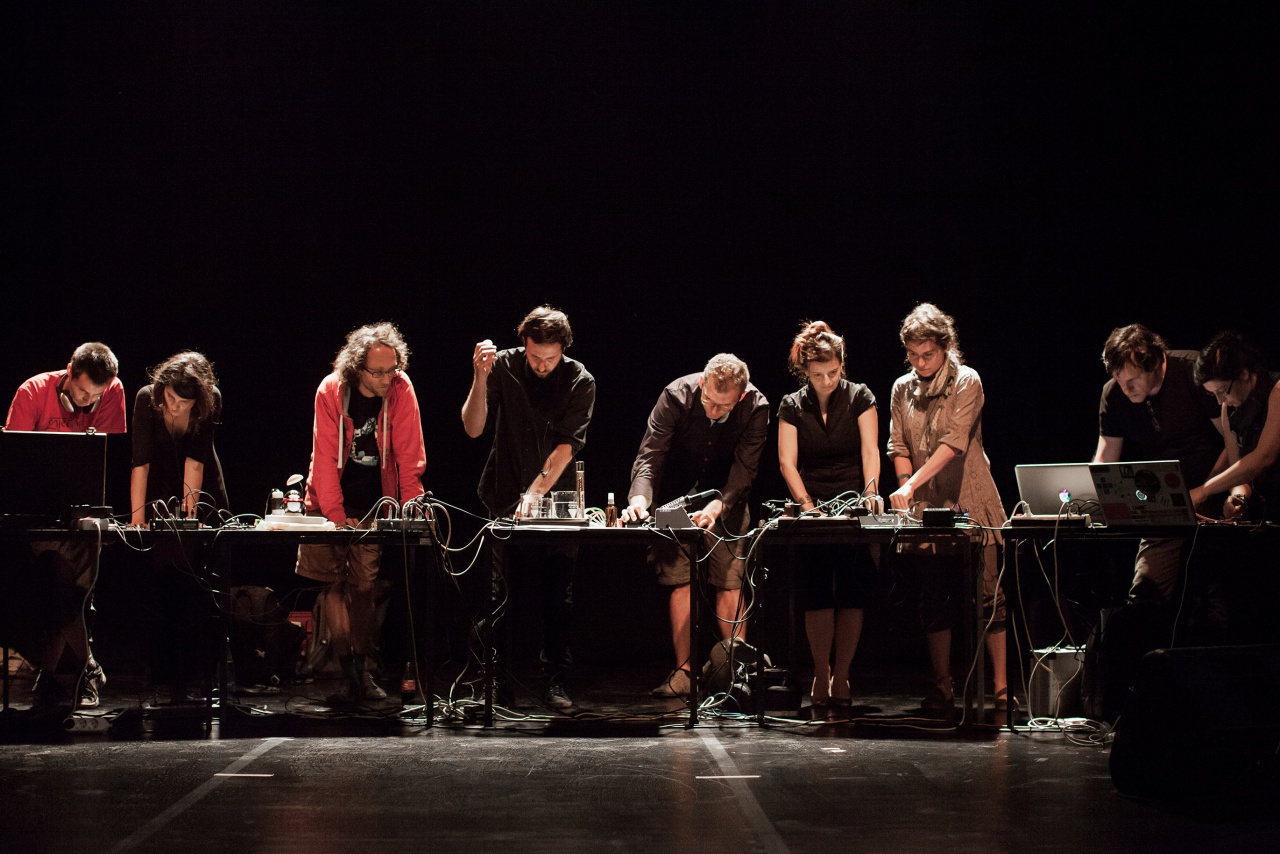 Theremidi Orchestra, group of enthusiasts from Ljudmila Art and Science Laboratory performing at Mladi levi Festival and 7th edition of U3 Triennial of Contemporary Slovene Arts, 2013
Theremidi Orchestra, group of enthusiasts from Ljudmila Art and Science Laboratory performing at Mladi levi Festival and 7th edition of U3 Triennial of Contemporary Slovene Arts, 2013
See also
- PIFcamp
- Culture.si
- Kulturnik.si
- Strictly Analog Festival
- Theremidi Orchestra
- Projekt Atol Institute
- Creative Commons Slovenia
- Ljudmila - Ljubljana Digital Media Lab (further history of the laboratory)
External links
- Ljudmila Lab website
- Powered by Ljudmila - exhibition at City Art Gallery Ljubljana in June 2011
- Documents of the programme Digital Agenda in the Field of Culture, 2013 (in Slovenian)
- The final document Digitalisation Guidelines - Cultural Heritage Long-term Preservation and Access (in Slovenian)



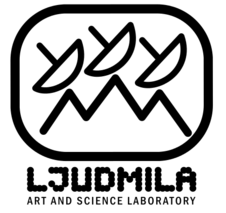
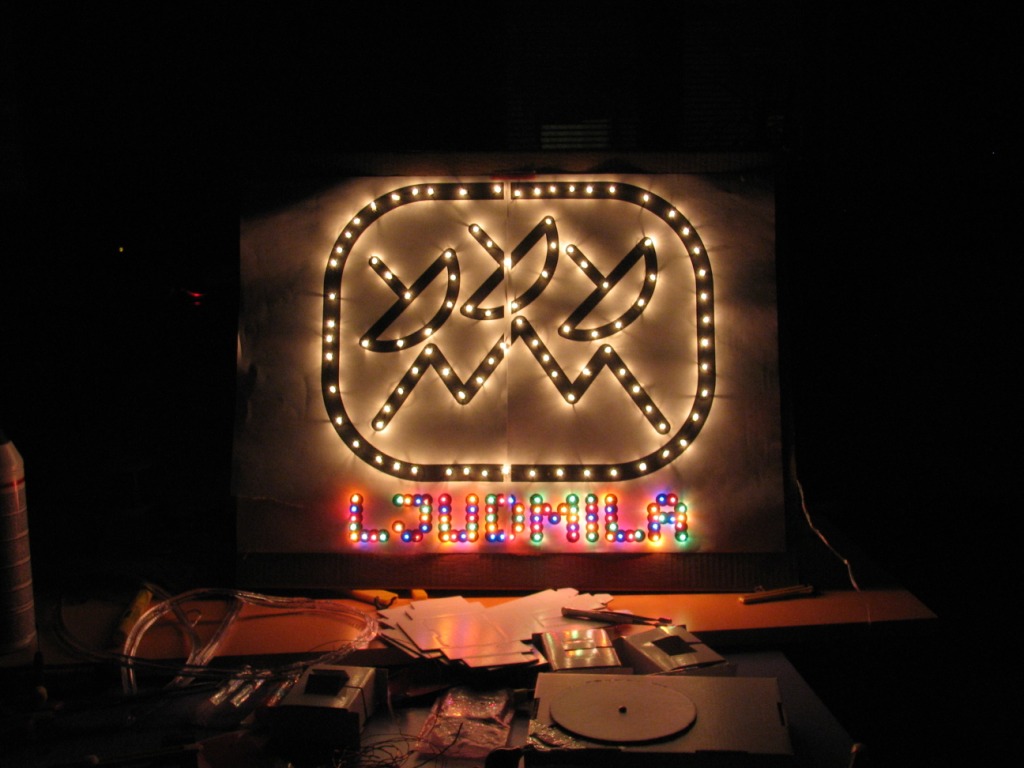
![Od oblike do oblike [Form from Form] in Match Gallery by Dan Adlešič, Tilen Sepič and Matic Potočnik, Lighting Guerrilla Festival in co-production with Ljudmila Art and Science Laboratory, 2013](/images/thumb/c/c5/Lighting_Guerrilla_Festival_2013_Form_from_Form.JPG/576px-Lighting_Guerrilla_Festival_2013_Form_from_Form.JPG)
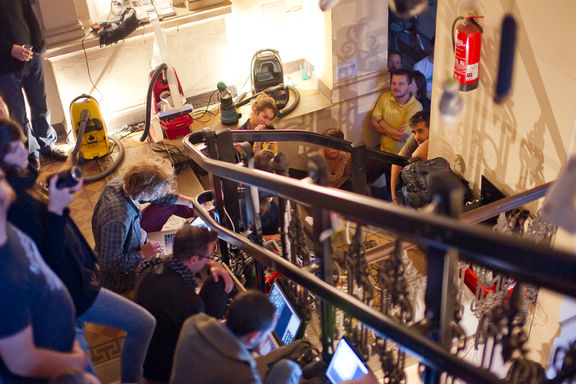
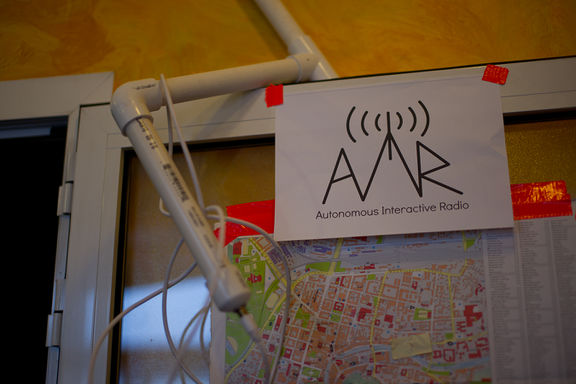
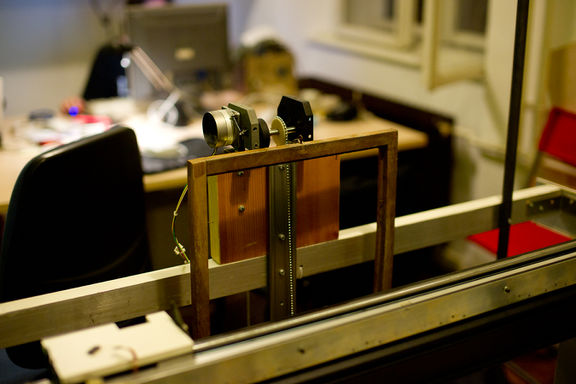
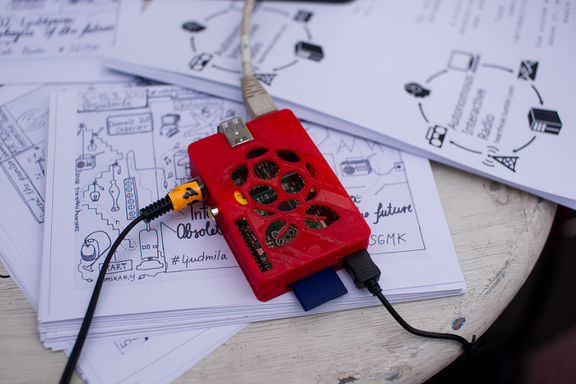
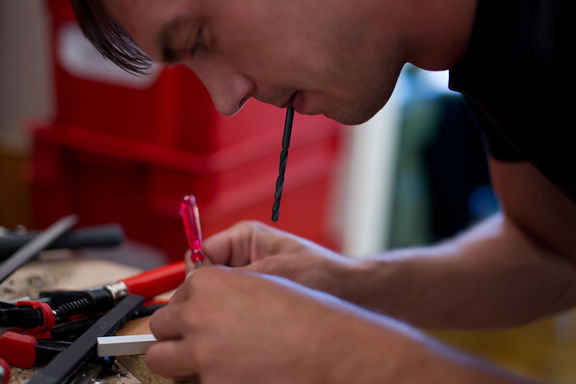
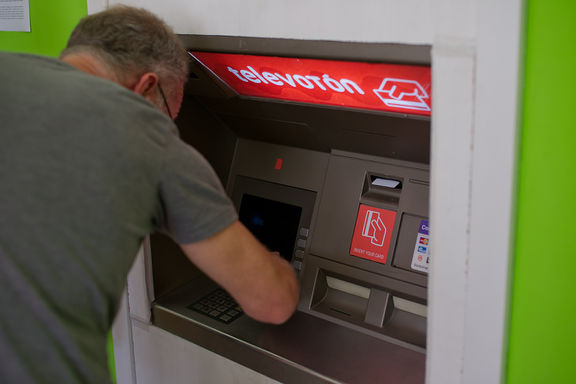
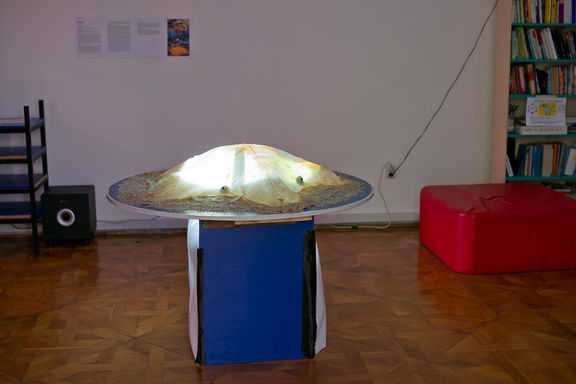
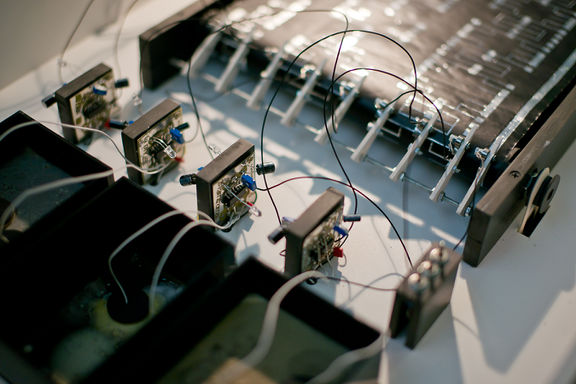
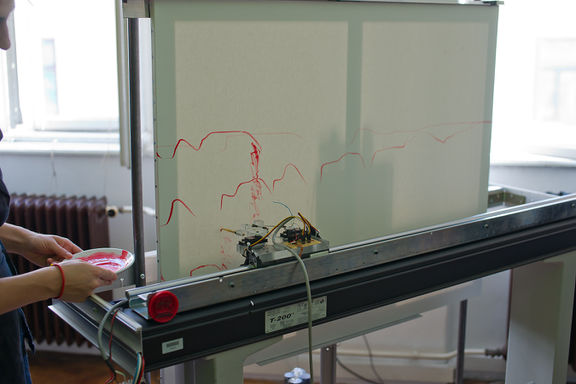
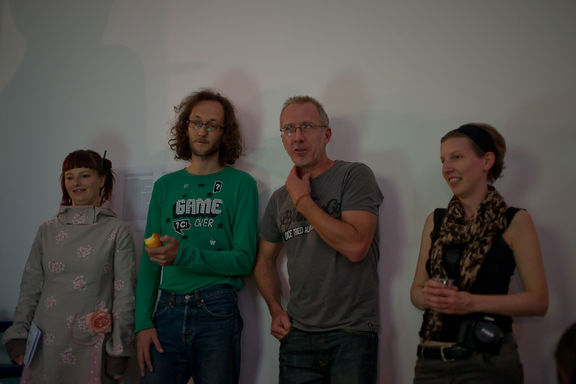
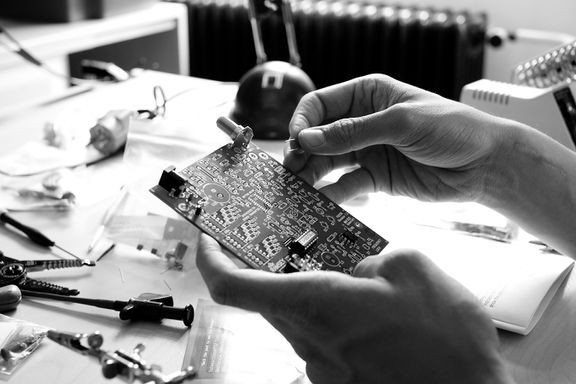
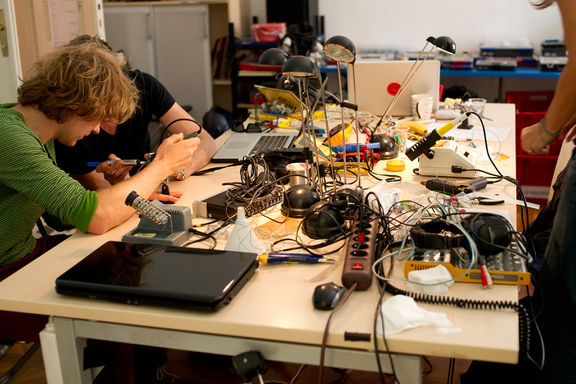
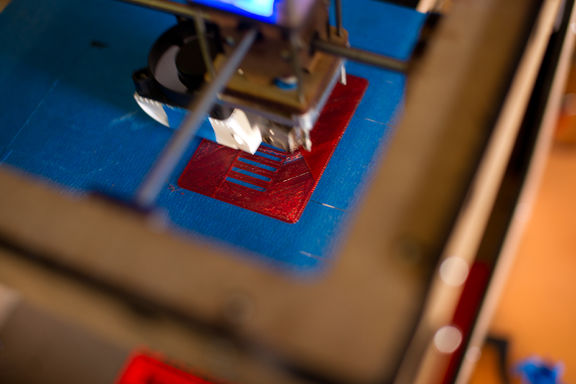
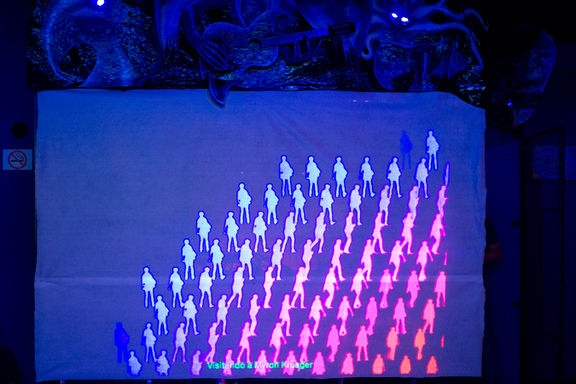
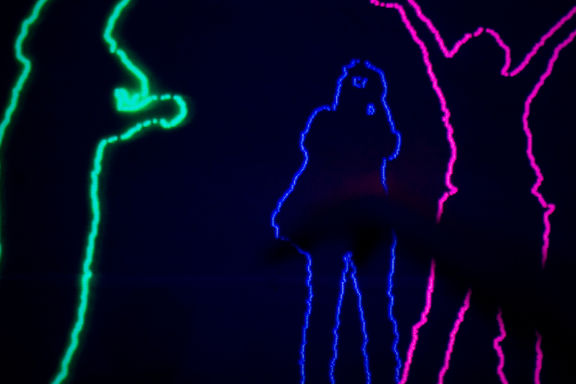
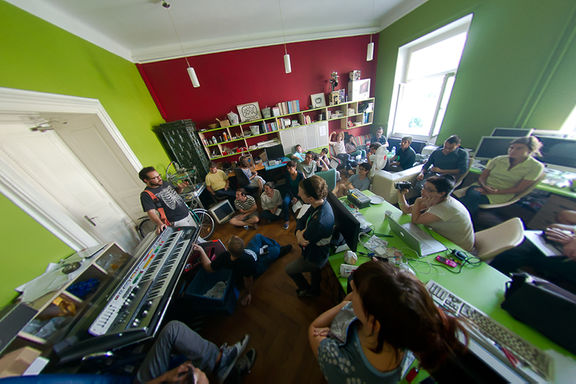
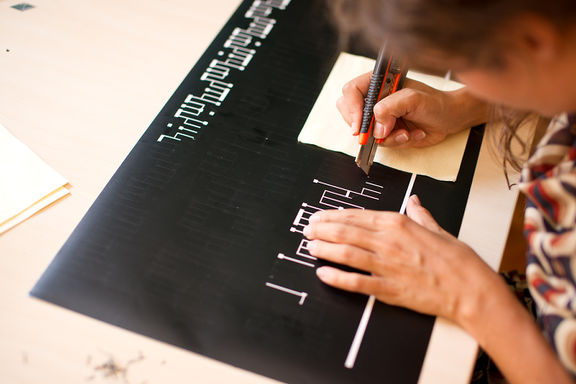
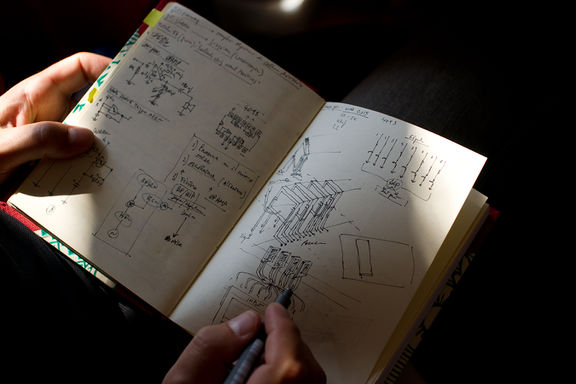
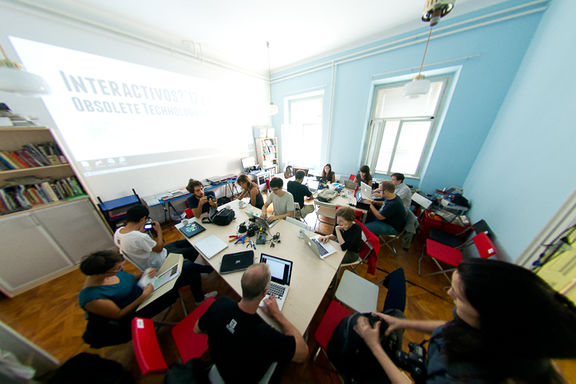
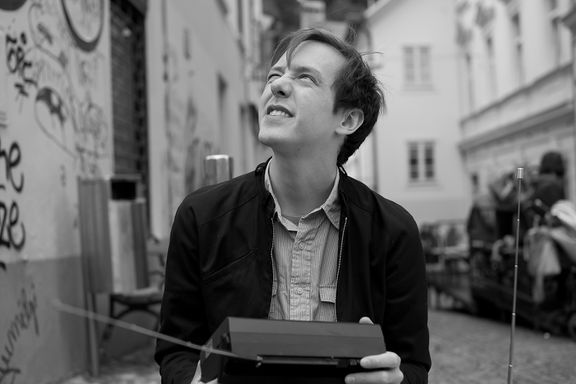
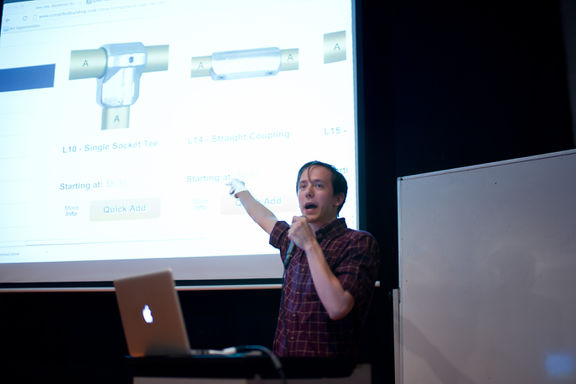
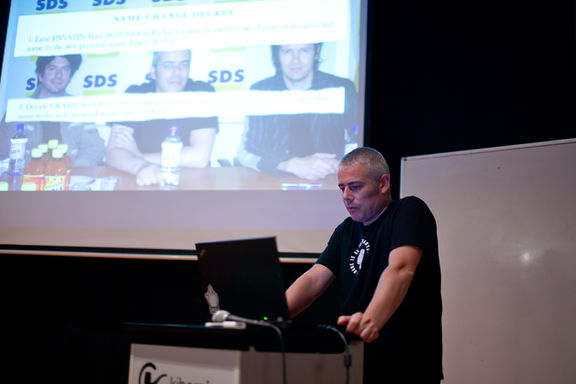
![Nevromat [Neur-O-Matic], an installation by Lenka Đorojević & Matej Stupica that got the OHO Group Award in 2015](/images/thumb/b/b7/Ljudmila_Art_and_Science_Laboratory_2014_Dorojevic_Stupica_Neur-O-Matic_Photo_Miha_Peterlic_%282%29.jpg/576px-Ljudmila_Art_and_Science_Laboratory_2014_Dorojevic_Stupica_Neur-O-Matic_Photo_Miha_Peterlic_%282%29.jpg)
![Nevromat [Neur-O-Matic], Lenka Đorojević & Matej Stupica, produced by Ljudmila Art and Science Laboratory and Projekt Atol Institute, 2014. An OHO Group Award winner.](/images/thumb/9/99/Ljudmila_Art_and_Science_Laboratory_2014_Dorojevic_Stupica_Neur-O-Matic_Photo_Miha_Peterlic_%283%29.jpg/576px-Ljudmila_Art_and_Science_Laboratory_2014_Dorojevic_Stupica_Neur-O-Matic_Photo_Miha_Peterlic_%283%29.jpg)
![Nevromat [Neur-O-Matic] by Lenka Đorojević & Matej Stupica, produced by Ljudmila Art and Science Laboratory and Projekt Atol Institute, 2014](/images/thumb/0/06/Ljudmila_Art_and_Science_Laboratory_2014_Dorojevic_Stupica_Neur-O-Matic_Photo_Miha_Peterlic.jpg/576px-Ljudmila_Art_and_Science_Laboratory_2014_Dorojevic_Stupica_Neur-O-Matic_Photo_Miha_Peterlic.jpg)
